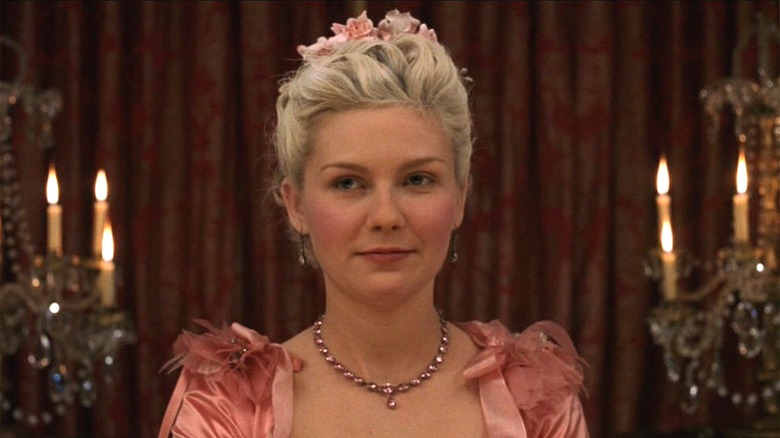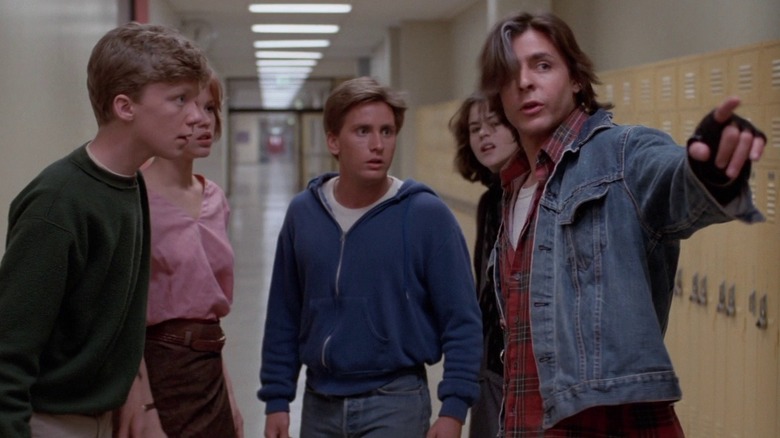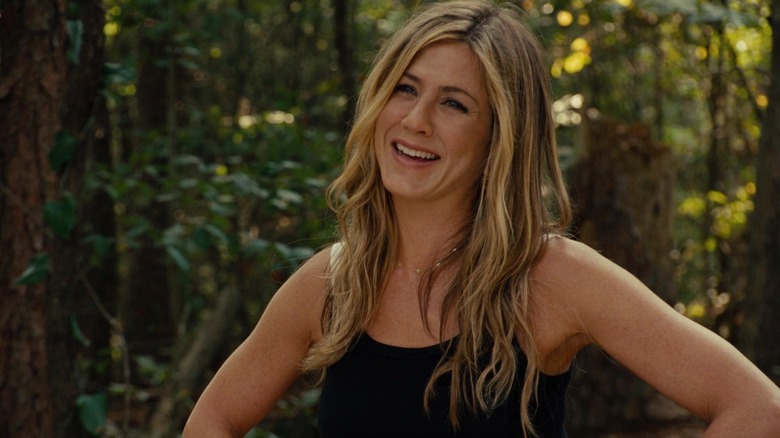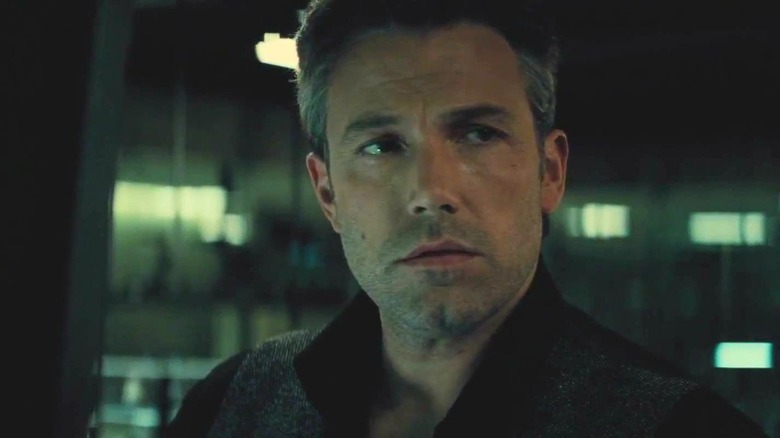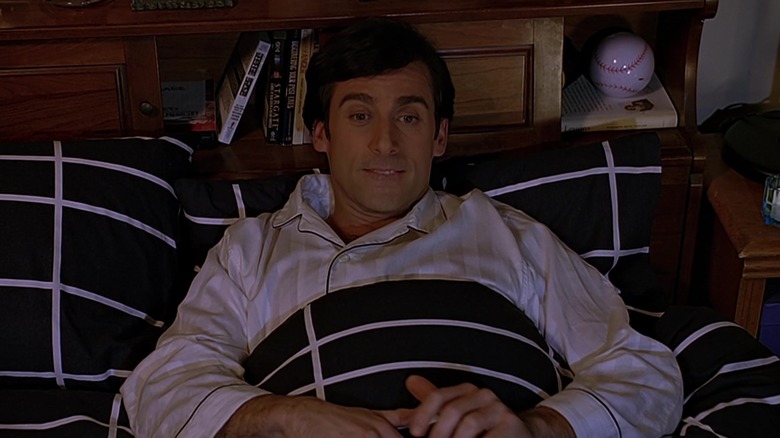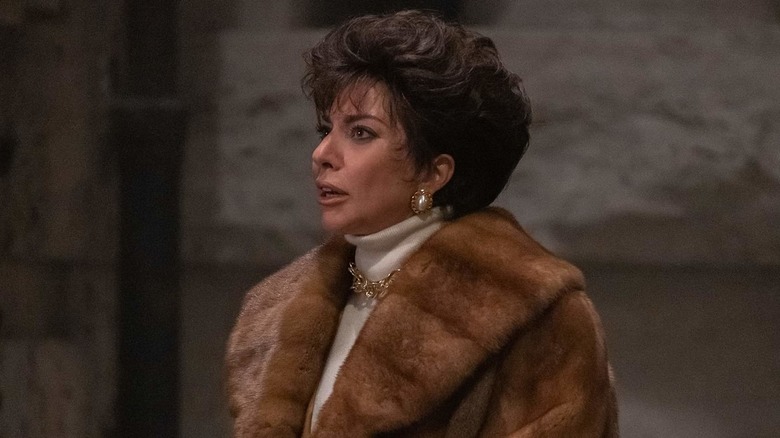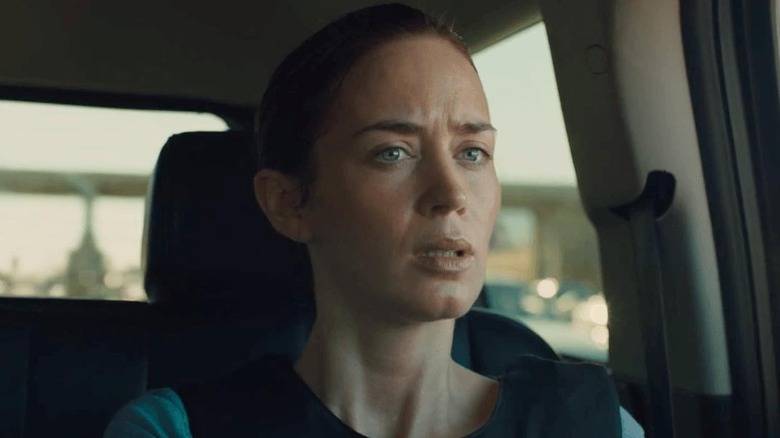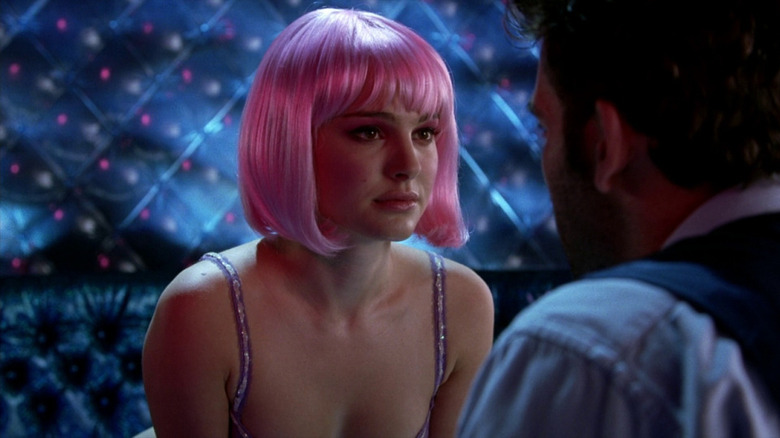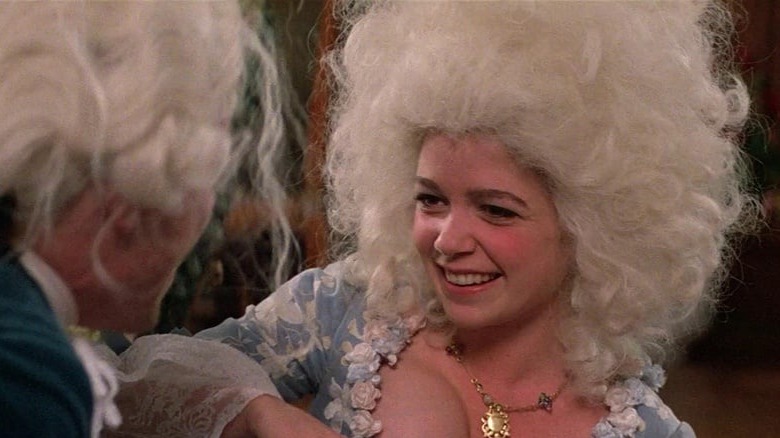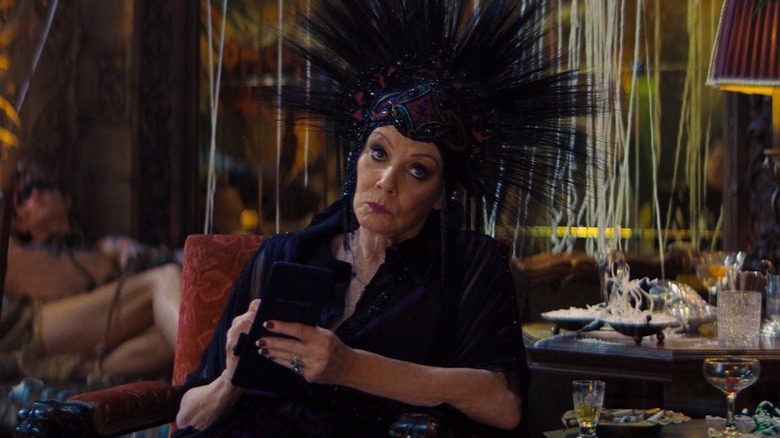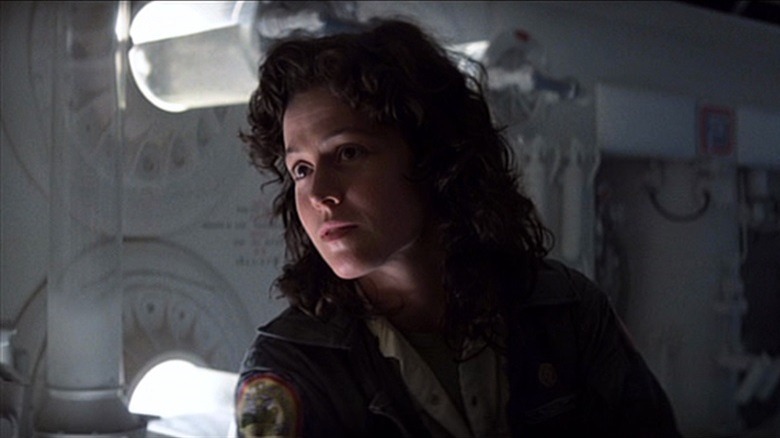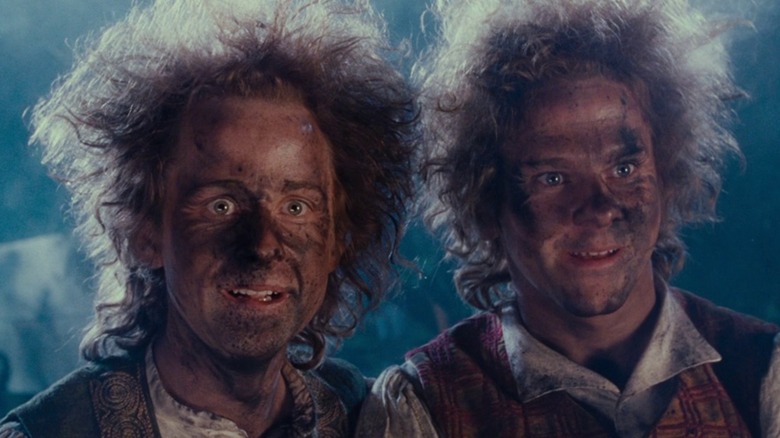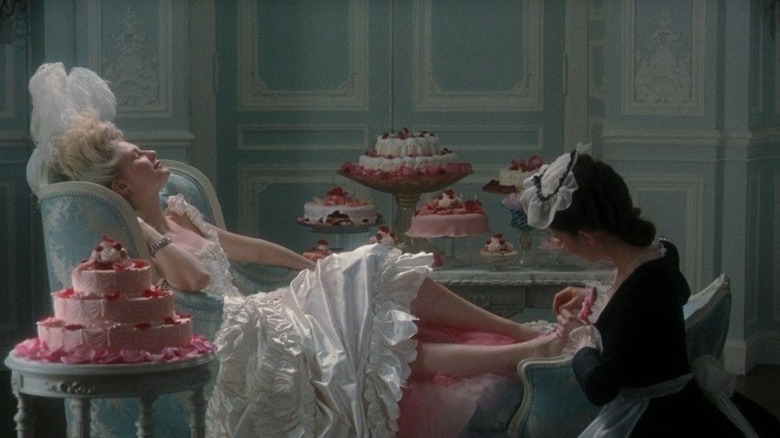Deleted Nude Scenes That Would've Changed The Movie
Nudity has been part of cinema since almost the beginning, and there is a lot that goes into filming nude scenes. There are examples of it in mainstream Hollywood movies as early as the 1930s, with films like "All Quiet on the Western Front" and Cecil B. DeMille's "Cleopatra." It's a topic that has always been — and likely always will be — a divisive one, with some arguing that nudity in movies is gratuitous, while others say it has its place and can be artistic in the right context.
Sometimes nudity is planned for a movie but doesn't make it into the final theatrical version. Whether a character or characters had naked moments in the script that were never filmed, or nudity was in an early cut but eventually removed, there are many examples of a movie that doesn't have any nudity at all but could have. It might not seem like a huge deal whether a planned nude scene is included or not — other than the difference between a PG-13 and an R rating — but there are times when the decision ends up having an impact on the movie as a whole, for better or worse. We take a look at some nude scenes that would've changed the movie.
The Breakfast Club
The filmography of John Hughes consists largely of movies that are PG-13 at their edgiest. His bread and butter were family comedies and coming-of-age stories, but "The Breakfast Club" proved that he wasn't afraid to push things into R territory from time to time. It got there entirely because of the movie's dialogue, which contained not only a healthy dose of profanity but also frank discussions about sex, violence, and other mature topics.
As it turns out, "The Breakfast Club" nearly earned its R rating because of nudity as well. As part of an unfortunate trend in comedies of that era, the movie was going to have a scene that featured a naked woman for no particular reason. Even worse, the naked woman in question was going to be viewed through a peephole that looked into the girls' locker room. It was at least going to be a grown-up faculty member and not one of the female high school students, for what that's worth. Fortunately, producer Michelle Manning and stars Molly Ringwald and Ally Sheedy called out Hughes for the gratuitous and completely unnecessary scene, and he never filmed it. The change went a long way in helping "The Breakfast Club" stand out among its peers both at the time and especially in aging better than so many similar movies of the era.
Wanderlust
The 2012 ensemble comedy "Wanderlust" is about married couple George and Linda Gergenblatt (Paul Rudd and Jennifer Aniston) whose fancy New York City life falls apart when the economy does. Looking for a fresh start, they find themselves at a commune full of wacky characters, and comedic hijinks ensue. Among those hijinks are Linda taking part in a topless protest that is captured by television cameras. All you see in the movie is the pixelated version on the news report — but depending on who you ask, Aniston was going to bare all for the scene.
A source at the time alleged that Aniston did shoot a version of the scene where she is fully topless and that the unedited shot was included in the first cut of the film. The source explained that Aniston later begged to have those shots removed, and that — other than the pixelation — she was only to be shown from behind or from the neck up in any shots of her while she was topless. The actor's publicist denied the claims, insisting that the version of the scene in the final movie was the one that was always intended. Either way, having Linda's breasts front and center would've diminished the shock of seeing the blurred-out version during the news broadcast, which was essentially the punchline of that scene.
Batman v Superman: Dawn of Justice
Given that female superheroes in movies haven't always been portrayed in the most positive way, it's easy to assume that Wonder Woman or Harley Quinn was supposed to get naked at one point in the DC Extended Universe films. However, it was Bruce Wayne (Ben Affleck) who stripped down in a deleted scene from "Batman v Superman: Dawn of Justice."
It wasn't a racy sex scene involving Batman, instead, the scene in question was a shower sequence, during which the camera revealed Affleck's bare behind. While it was included among the deleted scenes of the "Ultimate Edition" home video release of the movie, it didn't make it into the original theatrical cut. Even while trying to be the edgier, more mature counterpart to the Marvel Cinematic Universe, the DCEU remained in PG-13 territory until "Birds of Prey" and "Zack Snyder's Justice League" came along. Had "Batman v Superman" been allowed to have a little nudity, maybe we could've gotten the superior R-rated version of "Justice League" right away rather than having to settle for the watered-down Joss Whedon cut — and the DCEU might have had a fighting chance.
The 40-Year-Old Virgin
For a movie that is a hard R sex comedy, there is almost no actual nudity in "The 40-Year-Old Virgin." A woman has one exposed breast during the speed dating scene, but that's about the extent of it. There is even a scene where the primary protagonist Andy (Steve Carell) is watching adult movies donated to him by work pal David (Paul Rudd), and it still shows very little skin. That being said, one of the performers in those videos did bare all, but it was in a scene that wouldn't be seen until the movie's unrated version.
Stormy Daniels, who subsequently became a household name due to an alleged connection to a certain president, is a real-life adult film actress and the woman most prominently seen in David's videos. According to writer and director Judd Apatow, that scene was taken from one of Daniels' existing films. But she was also brought in to shoot a scene specifically for "The 40-Year-Old Virgin" in which Andy has a fantasy about her and the two have a conversation — with Daniels fully topless the entire time. The whole scene was cut from the original theatrical version but restored for the unrated version later released on DVD and digital. It ends up feeling surprisingly uncomfortable and out of place, proving that perhaps excessive nudity isn't required or necessary for a raunchy sex comedy to be effective.
House of Gucci
Few musicians have seen more critical and commercial success in recent years crossing over into acting than Lady Gaga. In 2019, she not only landed an Oscar for her duet "Shallow" with her "A Star is Born" co-star Bradley Cooper, but she earned a best actress nomination for her work in that movie as well. In 2021, she got more raves for "House of Gucci," which critics were lukewarm on overall but called out her performance in the movie as a highlight. The Ridley Scott-directed film tells the story of renowned fashion brand Gucci and the struggle for control between Maurizio Gucci (Adam Driver) and eventual ex-wife Patrizia Reggiani (Lady Gaga) — culminating in Patrizia spending decades in prison for hiring a hitman to murder Maurizio.
"House of Gucci" takes plenty of liberties with the real story for the sake of a more entertaining final product. And those liberties would've been taken to an unnecessary extreme if it included a sexual relationship between Patrizia and Giuseppina "Pina" Auriemma (Salma Hayek), a psychic whom Patrizia befriends and who eventually helps with the murder plot. It seems that Lady Gaga just decided that Patrizia and Pina should hook up even though there is nothing to suggest the two women had such a relationship in real life. Scott obliged, even going so far as to film a steamy sex scene with the two actors — but he didn't end up using it in the movie.
Sicario
Before discovering the sci-fi niche he's been largely sticking with since 2016's "Arrival," filmmaker Denis Villeneuve had a run of well-received thrillers that culminated in "Sicario" the year prior. Focusing on the war between Mexican drug cartels and the FBI, "Sicario" features an impressive cast, led by Emily Blunt as Special Agent Kate Macer. Both she and co-star Benecio Del Toro were the most frequent targets of praise for the film, with the Rotten Tomatoes consensus stating, "Led by outstanding work from Emily Blunt and Benicio del Toro, Sicario is a taut, tightly wound thriller with much more on its mind than attention-getting set pieces."
Villeneuve is no stranger to having women play central roles in his films, and he tends to represent them well in the process. In fact, the director said that "Sicario" screenwriter Taylor Sheridan was asked to change Blunt's character to a man, but Villeneuve advocated for Special Agent Macer to stay Kate Macer. It's unclear what would've happened to the nude scene in the script if Kate had been changed into a man, but it was axed anyway when Blunt pushed against it. The actor told Howard Stern, "[the scene] came out because we didn't agree with it," clarifying that the "we" in question referred to herself and her breasts. Besides, a scene of gratuitous nudity doesn't seem to fit in a film that was otherwise praised for avoiding attention-getting gimmickry.
Closer
Natalie Portman left little to the imagination in her performance of Alice — aka Jane — in the intense 2004 relationship drama "Closer." In particular, a scene between Alice and Larry (Clive Owen) in a private room of a strip club has Portman wearing what amounts to underwear and being shown from almost every imaginable angle. It actually does make sense in the context of the scene that Alice never fully strips naked; she's toying with Larry and using his attraction to her to emotionally manipulate him. But Portman did film a version of the scene where Larry gets to see everything he wants to see, which might have lessened her power over him and changed the story's dynamic.
Ultimately, Portman had a change of heart and decided she didn't want to be fully nude in the movie. "Closer" director Mike Nichols honored her wishes and only included the shots of Alice where she is at least partially covered. Nichols even claimed that he destroyed all of the footage he shot that contained Portman naked, so there was no chance of it ever being stolen and leaked onto the internet. In an interview for a book about Nichols's career, Portman had nothing but praise for how he treated her while making "Closer," calling Nichols a feminist and saying he was never creepy towards her in any way — and that she can't make that same claim about other older male mentors she had in the industry.
Amadeus
It may seem like a foregone conclusion that a director's cut is automatically superior to the original theatrical version of a movie. Indeed, cinema history has numerous examples where that is the case. But there have also been instances where a director's cut doesn't seem to add anything of substance to the core film, proving that the restored scenes were originally cut for a reason and the movie is simply more bloated with them included. An example of the latter is "Amadeus," the acclaimed 1984 period biopic that tells a loose version of the life of composer Wolfgang Amadeus Mozart (Tom Hulce).
In 2002, the film was remastered along with added scenes that had been cut from the original version and re-released to theaters as a director's cut. Among the 20 minutes of restored footage was a previously nixed subplot wherein Mozart's wife Constanze (Elizabeth Berridge) seeks help from composer Antonio Salieri (F. Murray Abraham), who has the clout to further the career of the struggling Mozart. Salieri agrees, but under the heavily implied condition that Constanze will need to reward him sexually in exchange for his help. This leads to a scene where Constanze undresses in front of Solieri. Writing about the director's cut, The AV Club called the moment "both jarring and excessive" while also pointing out how the majority of the director's cut-specific scenes only detracted from the quality and pacing of the original film.
Babylon
Anyone who has seen the 2022 film "Babylon" might find it hard to believe that anything was left on the cutting room floor, especially in terms of naked bodies. After having earned the clout to do pretty much whatever he wanted after the success of "Whiplash" and "La La Land" in particular, filmmaker Damien Chazelle used that creative freedom — and the apparently unlimited budget that came with it — to create a three-hour epic about the unchecked debauchery of 1920s Hollywood.
Early buzz about "Babylon" suggested that an NC-17 rating was in the cards, and it's not hard to see why. In fact, it's somewhat surprising the movie managed to get away with all it got away with and still come in with an R. But it would seem that there were scenes that were shot but subsequently deleted that very well might have pushed the rating board to give it the stricter rating. According to Jean Smart, who plays fictional film critic Elinor St. John in the movie, she was in a scene that involved four naked men that was shot but didn't make it in the final cut. Smart explained that the men in question were just playing football in the background of the shot, which feels like adding extra nudity just for the shock rather than using it to make a statement about the behavior of the Hollywood elite of that era.
Alien
There's no arguing that one of the most enduring images of the pioneering sci-fi horror classic "Alien" is Sigourney Weaver's Ripley in nothing but a tank top and a pair of panties. But she doesn't spend all that much time in that state — she has a ship and crew to defend against one of the most terrifying monsters in movie history. "Alien" is too busy being a masterclass in building tension and in making its audience fear a monster that they see fairly little of to waste too much time ogling anybody's bodies.
The original script and storyboards for "Alien," however, planned for a lot of sex to be happening within the tight confines of the Nostromo. One of those scenes was partially filmed during Weaver's screen test for the movie. It was reasoned that the crew of the ship would often sleep together not only as a means of bonding but also just out of boredom of being stuck on a spaceship for long periods. It seems that, other than the aforementioned screen test, none of the sex scenes or nudity ever made it off the page. The result is that "Alien" ended up being almost entirely sexless, something that not only set it apart from Scott's next sci-fi film ("Blade Runner") but also many of the horror movies of the day.
The Lord of the Rings trilogy
It needs to be addressed that nudity in movies isn't always there for purposes of titillation. Sometimes characters — most often male characters — appear naked during a film for comedic purposes. And that was going to be the case with the planned but ultimately canceled nude scenes for the "Lord of the Rings" movie trilogy. Anyone who has read J.R.R. Tolkien's original novels knows that they did in fact contain nudity. Yet there isn't so much as even a bare behind in the entire 11+ hour runtime of the three movies that comprised the original trilogy: "The Fellowship of the Ring," "The Two Towers," and "The Return of the King."
While appearing on "The Late Show with Stephen Colbert" to discuss their "LotR"-centric podcast "The Friendship Onion," actors Dominic Monaghan and Billy Boyd — hobbits Merry and Pippin, respectively — shared that audiences almost had a chance to see their naked hobbit butts on screen. Though he didn't specify which movie it would've appeared in, Boyd explains that co-screenwriter Phillipa Boyens was planning a scene where Merry and Pippin get dropped by Treebeard and, as they fall, they slowly shed clothing as they careen off of Treebeard's branches — and are fully nude by the time they land. The hobbits were often the slapstick comic relief of those films, but that would've taken it into territory that was a little too on the juvenile side.
Marie Antoinette
Sofia Coppola quickly established that she was a force to be reckoned with behind the camera. "The Virgin Suicides" and "Lost in Translation" comprised a stellar one-two punch of debut feature film efforts, the latter of which earned Bill Murray his first and thus far only Oscar nomination. But Coppola's third movie, "Marie Antoinette," proved much more divisive, with critics split on the effectiveness of marrying the story of the titular 18th-century queen with a modern soundtrack and actors who not only spoke English but didn't even attempt European accents.
In her performance of Antoinette, Kirsten Dunst was generally praised — with Roger Ebert calling her "pitch-perfect in the title role." Dunst deserves credit for moving into more indie films in the latter half of the 2000s and into the 2010s, whereas she could've probably continued to coast along in rom-coms and other easy paycheck roles. With Coppola, Dunst had a lot of trust in the director's guidance — up to and including allowing her to shoot Dunst's bare breasts while filming "Marie Antoinette." But Dunst's comfort with being topless on camera proved short-lived, and she didn't end up okaying that take for use in the movie. It's for the best, as including the scene would've robbed the character of much of the innocence that made her unfortunate end all the more tragic.
